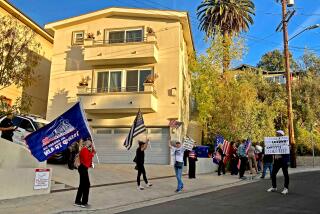Repression, Rigidity
- Share via
The successful suppression by South African police and military of the protest march to Pollsmoor Prison on Wednesday says a good deal about the grim situation.
Obviously, repression prevails. The government of the white minority has the power to maintain its authority over the black majority now and for the foreseeable future.
And, equally obviously, rigidity prevails. None of the significant concessions that the government itself has spoken of in private have been put forward in public. South Africa is stuck in a terribly dangerous situation.
The government has been warned over and over again of the danger that it is courting by suppressing the peaceful means of political dissent, but it has rejected the counsel. Even 8-year-olds are arrested. The march that was prevented with whips, shotguns and tear gas on Wednesday was planned as a peaceful assembly. The sponsors’ goal was to draw attention to the importance of releasing Nelson Mandela, the head of the African National Congress, from prison if a political settlement is to be drawn.
Not only was the march blocked by brute force, but also one of its leaders and organizers, the Rev. Allan Boesak, was imprisoned on the eve of the demonstration. He was jailed because the white minority simply will not distinguish between civil disobedience, the only outlet left to frustrated blacks, and criminal violence, which people like Boesak deplore as vigorously as the government itself.
The officials in Pretoria seem far more impressed by the plunge in value of their currency than in the abuse of human rights. That plunge in value, however, is one of the more measurable results of the blind, stubborn perpetuation of apartheid.
There must inevitably be confusion also in Pretoria about foreign views. The ignorance about South Africa, once again demonstrated by President Reagan in a weekend radio interview, will inevitably be seized on as encouragement by those who resist meaningful change, just as his comments on Aug. 5 about violence in South Africa led the South African state radio to proclaim him their best friend. The White House could have cleared the air by admitting the President’s muddle instead of trying to “explain” what was inexplicable. There is still time for that. No President is expected to know everything about every subject.
Spreading repression matching spreading violence will tempt excesses abroad as well as in South Africa. The Los Angeles County Board of Supervisors has wisely resisted moves to a divestiture program likely to do more harm than good. Now the constructive and measured response of the Regents of the University of California is under assault from those who want a more radical response. That is a mistake. Congress has provided an appropriate model for the nation’s response at this time with its legislation for limited sanctions.
The agenda for South Africa has already been written by President Pieter W. Botha. He has proposed negotiations with the majority leading to political participation by all. But he has then contrived to make the dialogue impossible--perhaps because he must know that it could lead only to common citizenship, to an end to homelands and tribal states, and eventually to full democracy. The economic fallout from his folly has already forced him to suspend stock-market trading.
Those economic traumas may serve better than the bloodshed in the townships to persuade the cabinet to listen to what the South African business community has been saying for some time: Apartheid must end.
More to Read
Sign up for Essential California
The most important California stories and recommendations in your inbox every morning.
You may occasionally receive promotional content from the Los Angeles Times.












